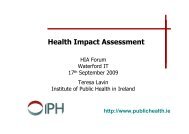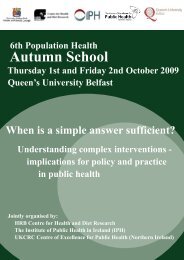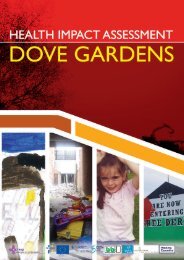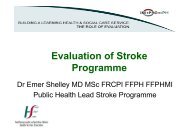Towards a future without cancer - Institute of Public Health in Ireland
Towards a future without cancer - Institute of Public Health in Ireland
Towards a future without cancer - Institute of Public Health in Ireland
Create successful ePaper yourself
Turn your PDF publications into a flip-book with our unique Google optimized e-Paper software.
European Week Aga<strong>in</strong>st Cancer 2013Wednesday 29th MayDay 1: <strong>Health</strong>y Lifestyles for Cancer Prevention15.45 – 17.15 Workshops – Refreshments ServedWorkshop 1Liver Cancer Prevention: gett<strong>in</strong>g viralhepatitis under controlThe European Liver Patients Association (ELPA)panel discussion on national and regionalviral hepatitis programmes. Goal: to identifymeasures and <strong>in</strong>struments, for effective liver<strong>cancer</strong> prevention. Relevant f<strong>in</strong>d<strong>in</strong>gs fromELPA’s viral Hepatitis <strong>in</strong>dex will complementthe discussion.Mr Charles Gore: President <strong>of</strong> the WorldHepatitis AlliancePr<strong>of</strong>essor Mark Thursz, Imperial Collegeand past Secretary General <strong>of</strong> the EuropeanAssociation for the Study <strong>of</strong> the LiverPr<strong>of</strong>essor Lidia Georgieva Assoc. Pr<strong>of</strong>essor<strong>in</strong> Medical University, S<strong>of</strong>ia, Faculty <strong>of</strong> <strong>Public</strong><strong>Health</strong>, Advisor at the M<strong>in</strong>istry <strong>of</strong> <strong>Health</strong>and consultant at EC, DG SANCO and DGResearch and InnovationsPr<strong>of</strong>essor Suzanne Norris is a consultanthepatologist/gastroenterologist at St James’sHospital and is associate pr<strong>of</strong>essor at Tr<strong>in</strong>ityCollege Dubl<strong>in</strong>Pr<strong>of</strong>essor David Goldberg, <strong>Health</strong>Protection Scotland and University <strong>of</strong> Glasgowand former Chair <strong>of</strong> Scotland’s Hepatitis CAction Plan Governance BoardWorkshop 2M<strong>in</strong>d the Gender Gap: Smok<strong>in</strong>g and Dr<strong>in</strong>k<strong>in</strong>g <strong>in</strong>Women and Young GirlsThe European <strong>Institute</strong> <strong>of</strong> Women’s <strong>Health</strong> will host thisworkshop on the serious health challenges for womendue to smok<strong>in</strong>g and b<strong>in</strong>ge dr<strong>in</strong>k<strong>in</strong>g. Cancer <strong>of</strong> the lung/bronchus is the third most common <strong>cancer</strong> amongwomen <strong>in</strong> Europe. The <strong>in</strong>crease <strong>of</strong> tobacco and alcoholconsumption is threaten<strong>in</strong>g not only the <strong>future</strong> health <strong>of</strong>women but also affects their children’s health.Co-Chairperson: Ms Peggy Maguire, Director General,European <strong>Institute</strong> <strong>of</strong> Womens <strong>Health</strong>Co-Chairperson: Mr Gerhard Steffes, Policy Officer,Programme and Knowledge Management Unit,Directorate for <strong>Health</strong> and Consumers (DG SANCO)The impact <strong>of</strong> alcohol on European womenPr<strong>of</strong>essor Joe Barry, Head <strong>of</strong> the Department <strong>of</strong> <strong>Public</strong><strong>Health</strong> and Primary Care , Tr<strong>in</strong>ity College for <strong>Health</strong>Sciences and Board Member <strong>of</strong> Alcohol Action <strong>Ireland</strong>Tackl<strong>in</strong>g Smok<strong>in</strong>g <strong>in</strong> Europe: Improv<strong>in</strong>g the health<strong>of</strong> women and girlsPr<strong>of</strong>essor L<strong>in</strong>da Bauld, <strong>Health</strong> Policy, University <strong>of</strong> Stirl<strong>in</strong>g“Me, My Smok<strong>in</strong>g and I”, X-HALE Youth Awards 2012Ms. Joanne Vance Senior <strong>Health</strong> Promotion Officer,Irish Cancer SocietyExpert panel discussion and recommendations byCo Chair Mr. Gerhard Steffes and Hildrun Sundseth,Head <strong>of</strong> <strong>Health</strong> Policy, EIWHEuropean Code Aga<strong>in</strong>st Cancer (third version)Many aspects <strong>of</strong> general health can be improved and many <strong>cancer</strong> deaths prevented, if we adopt healthier lifestyles:1. Do not smoke; if you smoke, stop do<strong>in</strong>g so. If you fail to stop, do not smoke <strong>in</strong> the presence <strong>of</strong> non-smokers.2. Avoid Obesity.3. Undertake some brisk, physical activity every day.4. Increase your daily <strong>in</strong>take and variety <strong>of</strong> vegetables and fruits: eat at least five serv<strong>in</strong>gs daily. Limit your <strong>in</strong>take <strong>of</strong> foodsconta<strong>in</strong><strong>in</strong>g fats from animal sources.5. If you dr<strong>in</strong>k alcohol, whether beer, w<strong>in</strong>e or spirits, moderate your consumption to two dr<strong>in</strong>ks per day if you are a man orone dr<strong>in</strong>k per day if you are a woman.6. Care must be taken to avoid excessive sun exposure. It is specifically important to protect children and adolescents. For<strong>in</strong>dividuals who have a tendency to burn <strong>in</strong> the sun, active protective measures must be taken throughout life.7. Apply strictly regulations aimed at prevent<strong>in</strong>g any exposure to known <strong>cancer</strong>-caus<strong>in</strong>g substances. Follow all health andsafety <strong>in</strong>structions on substances which may cause <strong>cancer</strong>. Follow advice <strong>of</strong> national radiation protection <strong>of</strong>fices.There are <strong>Public</strong> <strong>Health</strong> programmes which could prevent <strong>cancer</strong>s develop<strong>in</strong>g or <strong>in</strong>crease the probability that a<strong>cancer</strong> may be cured:8. Women from 25 years <strong>of</strong> age should participate <strong>in</strong> cervical screen<strong>in</strong>g. This should be with<strong>in</strong> programmes with qualitycontrol procedures <strong>in</strong> compliance with “European Guidel<strong>in</strong>es for Quality Assurance <strong>in</strong> Cervical Screen<strong>in</strong>g”.9. Women from 50 years <strong>of</strong> age should participate <strong>in</strong> breast screen<strong>in</strong>g. This should be with<strong>in</strong> programmes with qualitycontrol procedures <strong>in</strong> compliance with “European Guidel<strong>in</strong>es for Quality Assurance <strong>in</strong> Mammography Screen<strong>in</strong>g”.10. Men and women from 50 years <strong>of</strong> age should participate <strong>in</strong> colorectal screen<strong>in</strong>g. This should be with<strong>in</strong> programmeswith built-<strong>in</strong> quality assurance procedures.11. Participate <strong>in</strong> vacc<strong>in</strong>ation programmes aga<strong>in</strong>st hepatitis B virus <strong>in</strong>fection.This event has received fund<strong>in</strong>g from the European Commission.#ewac2013
















